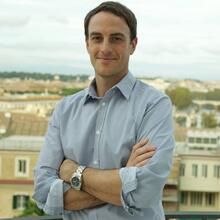A Reflection for Wednesday of the Second Week of Easter
You can find today’s readings here.
“When the captain of the temple guard and the chief priests heard this report, they were at a loss about them, as to what this would come to.” (Acts 5:24)
Reading the story of the early Church as it’s portrayed by St. Luke in the Acts of the Apostles is my favorite part of the Easter Season. Here we are, two thousand years later gathered as a community, celebrating the Eucharist and retelling the story of our Christian ancestors.
I find this version of the story in Acts more dramatic than the four Gospels. In the Gospels, there’s a sense of security and confidence throughout the story because of Jesus’ physical presence. Even during his Passion, when he is powerless and feeling abandoned, I can cling to a deep spiritual certainty that God is accompanying him, and through him, us.
Maybe it’s just me but I don’t get that feeling reading Acts. The community is desperately trying to figure out what life means after Jesus’ earthly life has ended. There are stories of great personal witness and courage, but also fear, division and ultimately uncertainty. I know the end of the story–that I am here reading it centuries later–but while reading, I’m never confident about the mission of the early church. A Pharisee named Gamaliel offers an astute insight here in the next verses of Acts. He tells the authorities to leave Jesus’ followers alone because a movement of purely human origin will destroy itself.
My uncertainty and lack of confidence–the seemingly real possibility that the early Christians will destroy the movement–comes from the fact that the earliest preaching about Jesus elicited diametrically opposed responses from the people. In some cases, like today’s first reading, the disciples’ preaching sparks intense and immediate persecution. In other cases, people are so taken by the love and witness of Jesus’ disciples that they immediately join the community. But without Jesus there, in person, how can we really be sure this polarizing movement is of God?
Today, I imagine most readers of America would denounce the polarization in our politics and society. As a magazine and media ministry, we are committed to efforts to overcome the deep-seated polarizing impulses within the church in the U.S. and Canada. Pope Francis himself said in an interview with my colleagues that “polarization is not Catholic.”
That said, there’s a biblical precedent of a different kind of polarization from the very beginning of the church: polarization as a response to the mission lived in the world. Without question, polarization within the community is a problem to overcome; but polarization resulting from the mission of the community is to be expected.
Each year, this story in Acts challenges me to face my feelings of uncertainty, even confusion, about the mission of the church. The path is not always clear. I don’t always have an answer to every question. I don’t know exactly how to overcome polarization in the church. But at least we’ve been through the drama before and we’re here in another Easter season re-reading our own story.








